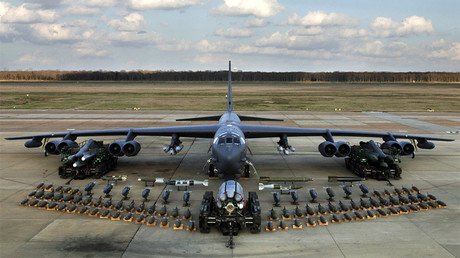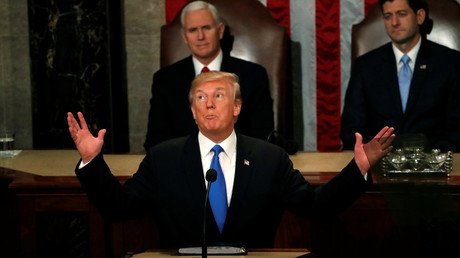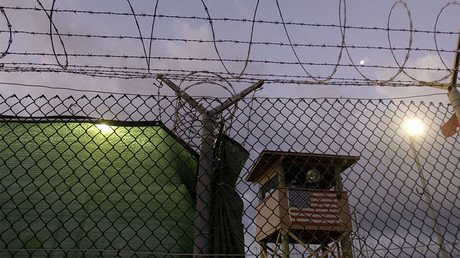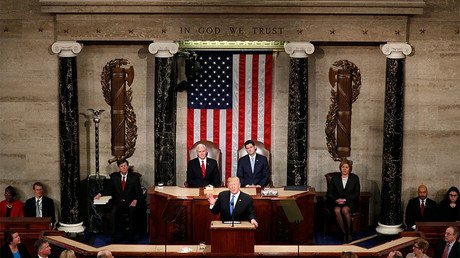'Trump’s State of the Union full of dog whistle noises to neo-cons'
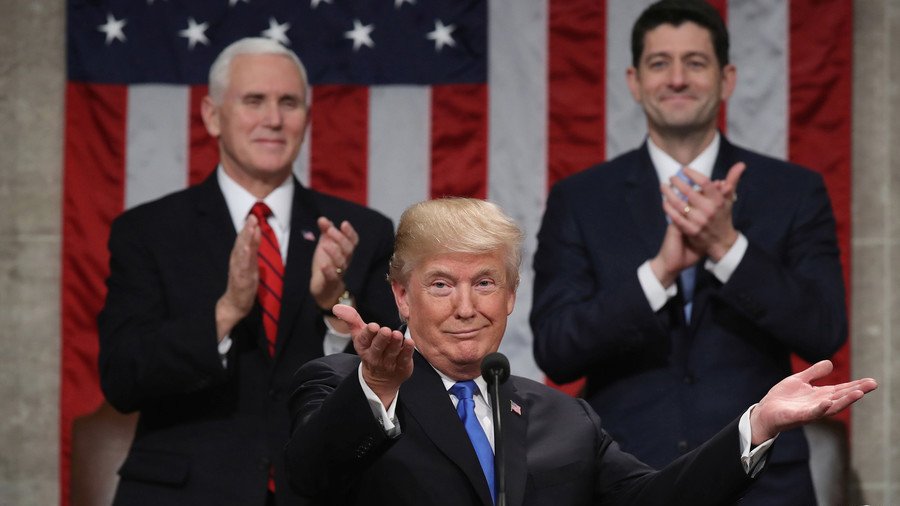
Donald Trump’s State of the Union speech was largely aimed at finding major 'enemies' to justify the US' enormous military chest, and appease defense industry war-hawks who have taken control of foreign policy, analysts told RT.
Trump delivered his maiden State of the Union address Wednesday. The speech appeared to be full of nods to please the powers within the US itself who are not happy with him, Executive Editor of 21st Century Wire.com Patrick Henningsen believes.
“I think it is important for Donald Trump that there is some concessions that he needs from people within his party to quite frankly want to see him go and the Democratic side of the house and Senate as well, he still needs to make some concessions and make some dog whistle noises to the neo-conservatives, for instance,” Henningsen told RT.
READ MORE: Breaking down Trump's 1st State of the Union address (VIDEO)
A significant part of the speech was devoted to justifying the overblown US defense budget through naming “enemies” to fight against. “We know that weakness is the surest path to conflict, and unmatched power is the surest means of our defense,” Trump said. “For this reason, I am asking the Congress to end the dangerous defense sequester and fully fund our great military.”
“The US is required to have major enemies to justify [its] $700 billion defense budget,” Henningsen said. ”These are all important noises for the president to make during the State of the Union address to sort of sure up support from the defense block.”
The US president devoted much time to one “enemy,” North Korea, which seems to be quite a weak bogey to justify the military spending and nuclear arsenal rebuilding, independent journalist Luc Rivet said.
“Why would he want to rebuild the nuclear arsenal, to develop the nuclear arsenal of the US which is another threat to the world, to world peace? And the only enemy that he can find is North Korea,” Rivet told RT. “With the present arsenal they could wipe out North Korea, with a tenth of the present American nuclear arsenal they could do it.”
The speech, as well as the most recent developments in the US, indicates that the “neoconservative war-hawking elements” have taken control of Trump, who has clearly veered away from his campaign promises, said Henningsen. “It’s evident in Mattis’ National Defense Strategy and the United States National Security strategy papers over the last two months,” he said.
Trump also said foreign funding should only go to allies which act in the interests of the US. “I am asking Congress to pass legislation to help ensure American foreign-assistance dollars always serve American interests, and only go to America's friends,” he said.
“The US seems to choose its friends and enemies quite poorly,” said Dan Kovalik, human rights lawyer and author of 'The Plot to Scapegoat Russia.' “For example, I am sure one country Trump puts in the 'friend' category is Saudi Arabia, a country which continues to destabilize the Middle East by backing jihadist forces throughout the region," Kovalik said.
"Trump also most certainly referred to Israel, despite the fact that the US' unconditional support for Tel Aviv continues to alienate the US from the rest of the world. I'm also sure that Trump is referring to Washington's continued support for the dictatorship in Honduras and the paramilitary state of Colombia.”
Talking about China and Russia, Trump described both as “rivals that challenge our interests, our economy, and our values,” but didn’t expand into his usual rhetoric of branding China as a threat to the US economy, and mentioned Russia only once.
The hysteria around 'Russiagate' in Washington actually makes relations between the two powers worse than during the Cold War, Henningsen believes.
“To Russia, however, we’re beyond ‘cold’ in terms of the Cold War. The rhetoric is much more aggressive, much more vociferous. The agenda is much more pernicious, even when the Cold War was happening between the US and the Soviet Union,” he said.
Describing Moscow and Beijing merely as “rivals,” however, might be a signal that Trump, while pleasing the domestic war hawks, tried to not worsen an already inflamed international situation, Kovalik said. “As we know, Trump never really wanted a spat with Russia to begin with, but has been bated into one by the 'Russiagate' attacks. In the end, I don't think he wanted to make things worse than what they already are by going after Russia in his speech.”
“As for China, Trump is probably afraid of a full-blown trade war given the recent tariffs he has imposed against Chinese goods, so again he did not want to further provoke China in his speech,” said Kovalik.
